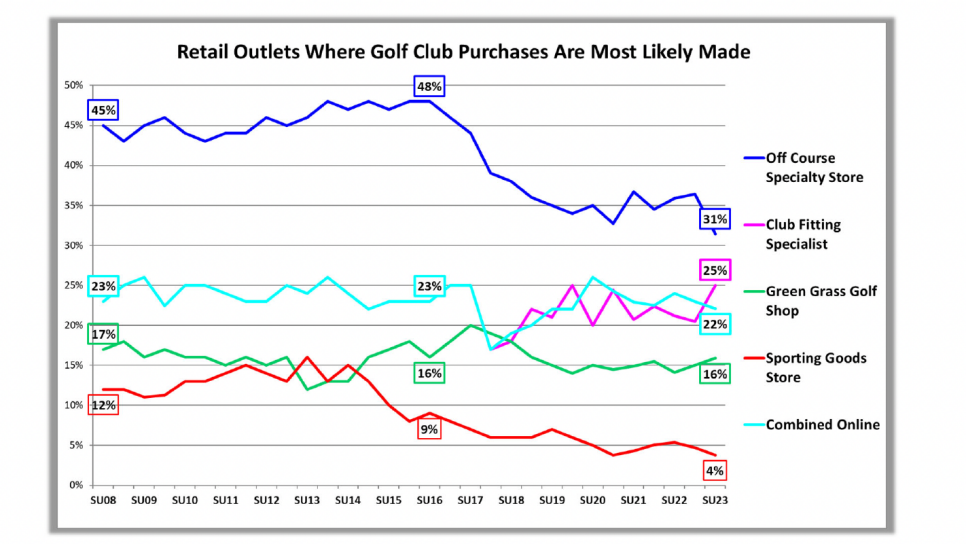Going on 25 years, Golf Digest has been stressing the value of getting fit for your clubs. Now, the latest research suggests most serious golfers are listening. That’s true across all ages and handicaps, according to numbers just released from Golf Datatech’s semi-annual study of the attitudes and usage of serious golfers.
One of the most telling nuggets in the research is that the specialty club fitter is more and more becoming the go-to for a serious golfers’ equipment purchases, a fundamental change in the golf retail landscape. When serious golfers were asked about where they would likely make their next club purchase, the first choice as expected was the off-course specialty store, but second was the clubfitting specialist, places that include large boutique chains like Club Champion, True Spec and Golftec but also independent facilities like many of those on Golf Digest’s list of the Best Clubfitters in America.
The off-course specialty stores were named by 31 percent as the most likely site of future purchase, but club fitting specialists were tabbed by 25 percent. That latter figure is eight points higher than it was just six years ago and is rising faster than any category, while the preference for the off-course golf specialty store has dropped from nearly 50 percent in 2016 to less than a third today. It’s also telling that the three largest golf retail chains Golf Galaxy, Worldwide Golf Shops and PGA Tour Superstore have all been pushing new efforts to expand their custom fitting programs.

Source: Golf Datatech
According to John Krzynowek, partner at Golf Datatech, the trend may be a reflection on how golfers are thinking about higher club prices and what a club fitting means to that purchase. Given that the average golfer in the survey now spends more than $1,100 a year on equipment, 55 percent more than he or she spent in 2010, getting that next driver, irons or putter purchase perfect has become paramount. And that seems to be true even in the case of spending an extra $300 or more just on the fitting process at these club fitting specialist facilities.
“It definitely has captured the imagination of serious golfers, the people who play a lot and are trying to get better all the time,” said Krzynowek, who recently completed a separate study on the state of clubfitting. “When we did the custom fitting study earlier this year, the satisfaction levels in the custom fitting specialists was through the roof. It was in the high eighties. You can’t deny the fact that if you go get fit at a custom fitter with a launch monitor, you end up with a better-playing product.”
Of course, that’s just it. What’s telling about the latest data is how it’s still the best players who think fitting matters the most. In another section of the report, while more than half of all players at all handicap levels say they have been fit for irons, those numbers are wildly different based on handicap. Fully 81 percent of the single-digit handicap players have been fit for irons, while only 51 percent of those with handicaps higher than 20. That’s a misconception on the part of middling or even beginner players, say most fitters. Many point out that the clubs you’re using may even be the problem with your lack of improvement.
“We believe that even if you are just starting to play the game, you should be fit for the proper length and weight of clubs,” said Dan Sueltz, CEO at D’Lance Golf outside of Denver, a Golf Digest Best Clubfitter. “This will help you create a better posture and more consistent swing. Once you are making consistent contact, we would then fit you for proper shaft flex, loft, lie and set makeup.”
The study, which tracks golfers who play 16 or more rounds a year and is available for purchase from Golf Datatech, noted that those who get fit for one club routinely want to get fit for other clubs. Nine in 10 respondents in the survey who were fit for their irons also were fit for a new driver, while nearly eight in 10 who were fit for their driver also have been fit for their irons.
The increased interest in fitting also is coinciding with longer purchase cycles. The report found that over the last decade the average length of time a serious golfer goes between club purchases has increased by more than a year, except in the case of wedges. Of course, wedges also are the least custom-fit club, according to the Golf Datatech research.

Source: Golf Datatech
“We don’t have any definitive answers, but the supposition is that people are thinking if you’re custom fit, you feel like you’re less likely to buy something in the near term unless you’re custom fit again,” Krzynowek said. “You’re not tempted by a sale, you’re not tempted by a close-out discount, you’re not tempted by hitting your buddy’s driver three times and wanting to buy it because you know you already have a driver that’s been custom fit for you.”
In an era where average selling prices for golf equipment across balls, woods, irons, wedges and putters have all more than doubled in the last decade, the grand takeaway from this growing interest in clubfitting specialists is something those who haven’t been custom fit for their clubs probably have never considered: Its biggest benefit might be in the money it saves you.
This article was originally published on golfdigest.com




